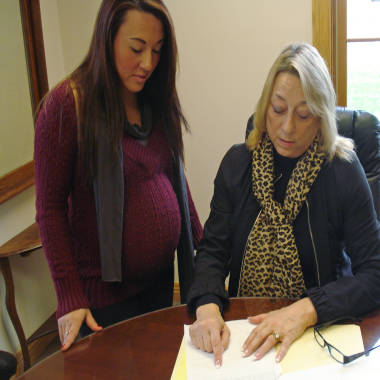Shackled and pregnant: Wis. case challenges 'fetal protection' law
By Daniella Silva, NBC News

When Alicia
Beltran was 12 weeks pregnant, she took herself to a health clinic about
a mile from her home in Jackson, Wis., for a prenatal checkup. But what
started as a routine visit ended with Beltran eventually handcuffed and
shackled in government custody – and at the center of a
first-of-its-kind federal lawsuit challenging the constitutionality of a
state’s fetal protection law.
On July 2, Beltran, 28, met with a
physician’s assistant at West Bend Clinic at Saint Joseph’s Hospital in
West Bend, Wis., for her prenatal visit. When asked to detail her
medical history, Beltran admitted a past struggle with the painkiller
Percocet. But that was all behind her, Beltran said: She had been taking
Suboxone, a drug used to treat Percocet dependency. Lacking health
insurance and unable to afford the medication, Beltran had used an
acquaintance’s prescription and self-administered the drug in decreasing
doses. She had taken her last dose a few days before her prenatal
visit.
According to Beltran, the physician’s assistant recommended she renew
her use of Suboxone under a doctor’s supervision. After Beltran
declined, she said she was asked to take a drug test, which was negative
for all substances except Suboxone.
Two weeks later, a social
worker visited Beltran at home and told her that she needed to continue
Suboxone treatment under the care of a physician, said Beltran, who
again declined. Two days later, Beltran found police officers at her
home, who arrested and handcuffed her.
According to the police
report, the officers took Beltran to a hospital, where she underwent a
doctor’s exam. Her pregnancy was found to be healthy and normal, her
lawyers say. Police then took her to Washington County Jail to await a
hearing – hours later, she was led into a courtroom, handcuffed and
shackled at the ankles, where a county judge ordered her to spend 90
days in a drug treatment center.
“Alicia had no idea she was
giving information to the physician’s assistant that would ultimately be
used against her in a court of law,” said Linda Vanden Heuvel of
Germantown, Wis., one of Beltran’s attorneys. “She should not have to
fear losing her liberty because she was pregnant and she was honest with
her doctor.”
At the hearing, her lawyers say, the judge told
Beltran that an attorney would not be provided for her at that time but
that she could seek counsel for her next hearing in the case. And yet, a
lawyer had been appointed to represent her fetus. “It’s wrong that an
unborn child gets an attorney but Alicia Beltran, the mother of that
unborn child did not,” said Vanden Heuvel.
Emails and phone calls
to Family Court Commissioner Dolores Bomrad and her office were not
returned. Assistant District Attorney of Washington County Mandy
Schepper declined to comment on the case.

Courtesy of Melissa Wanta
Alicia Beltran, who was forced to spend more than
two months in a drug treatment facility despite
her insistence that she was not abusing drugs,
talks with her attorney, Linda Vanden Heuvel
of Germantown, Wis.
At the center of Beltran’s case is a 1997 Wisconsin
law
that grants courts authority over the fetus of any pregnant woman who
“habitually lacks self-control” with drugs and alcohol “to a severe
degree” such that there is “substantial risk” to the unborn child.
Beltran’s lawyers argue that she was not using any controlled substances
at the time of her arrest.
In a
petition
filed in U.S. District Court in Milwaukee -- the first federal
challenge of an arrest of a pregnant woman under such a statute – her
lawyers claim that Beltran’s constitutional rights were violated in
numerous ways. The language of the Wisconsin statute is vague and
lacking in medical terminology, they argue, leaving too much room for
speculation. Further, they say the statute fails to guarantee due
process, as well as violates other rights, including privacy and
physical liberty.
In cases like Beltran’s, “the woman loses pretty
much every constitutional right we associate with personhood,” said
Lynn Paltrow, executive director of the National Advocates for Pregnant
Women and a co-counsel in Beltran’s case.
Experts say that
criminal prosecutions of pregnant women, as well as forced drug or
psychiatric treatment, have been on the rise in recent years in cases of
suspected substance abuse, especially as some states adopt laws
granting rights, or “personhood,” to fetuses.
National Advocates for Pregnant Women released
a study this year
showing that from 1973-2005, 413 pregnant women in 44 states were
arrested or forced into treatment. Since 2005, there were an additional
300 cases. But these statistics are likely a substantial undercount,
Paltrow said, since many of the proceedings happen behind closed doors.
As of this year, 17 states consider substance abuse during pregnancy to be child abuse under child-welfare statutes, according
to a report
by the Guttmacher Institute. Three of those states, Wisconsin,
Minnesota, and South Dakota, allow pregnant women to be forced into
mental health or substance abuse treatment facilities.
Other states have applied criminal charges such as delivery of drugs
to a minor or fetal homicide under the same circumstances. And at least
38 states have
“feticide” laws
on the books, which define fetuses as persons in homicide or
manslaughter cases. While these laws are often applied to cases
involving violence against pregnant women, they have also been used to
prosecute expectant mothers accused of killing a viable fetus.Supporters
of these laws say they are intended to protect unborn children. “Child
abuse is child abuse, whether it’s in the womb or out of it,” said
Jennifer Mason, communication director for Personhood USA, a non-profit
organization seeking personhood status for fetuses. Advocates of fetal
personhood claimed a victory in January when the Alabama Supreme Court
upheld the inclusion of unborn children in that state’s child
endangerment statute.
Some experts argue that prosecuting pregnant
women can ultimately put fetuses at risk, especially when healthcare
providers and social workers are the ones reporting women to
authorities. There is evidence indicating that women who fear criminal
charges or other state intervention are less likely to seek medical care
or be honest with their doctors, said Kenneth De Ville, a medical
humanities professor at East Carolina University in Greenville, N.C.,
who published a study on the Wisconsin law. “Prenatal care is really the
best thing you can do to enhance fetal health,” he said. “And you’re
driving women away from prenatal care.”
The American Congress of
Obstetricians and Gynecologists has argued that women who seek prenatal
care should not be exposed to criminal or civil penalties and calls for
expanded and affordable alcohol and drug treatment services for pregnant
women.
Mason said she agrees that women should be given
professional treatment before state intervention, but that when there is
clear evidence of fetal harm, criminal charges are often appropriate.
“It’s a very fine line. The medical professional has to be aware of what
puts babies in danger,” she said. “I do not think a pregnant woman’s
freedoms should be taken away, but child abuse cases are child abuse
cases and have to be treated the same way as a newborn in the home.”
For
Beltran, the consequences of her case have hit hard. Her family
struggled to visit her regularly during her stint at Casa Clare Women’s
Facility in Appleton, Wis., a two-hour drive from her home. After being
away from work for an extended period, Beltran lost her job in the food
service industry, according to her lawyers. She was released earlier
this month, but with the case still open, she is still at risk of being
taken into custody or ordered into further treatment, Paltrow said.
Beltran
was scheduled for a trial in a Washington County court on Oct. 29. If
she is found guilty under the Wisconsin law, the court could order her
into counseling, supervision by a social service agency, or mandatory
drug treatment, and could terminate her parental rights once her child
is born. But the trial has been removed from the court calendar --
county witnesses were unavailable on the given date, and a judge recused
himself for being familiar with the witnesses, Beltran’s lawyers
said -- and no new date has been set.
“[Beltran’s] happy about
this baby and having a child, but she doesn’t know what’s going to
happen,” Vanden Heuvel said. She added that in a recent conversation,
Beltran, who is due in mid-January, told her, “This is my first
pregnancy ever, and I just haven’t been able to enjoy it.”










